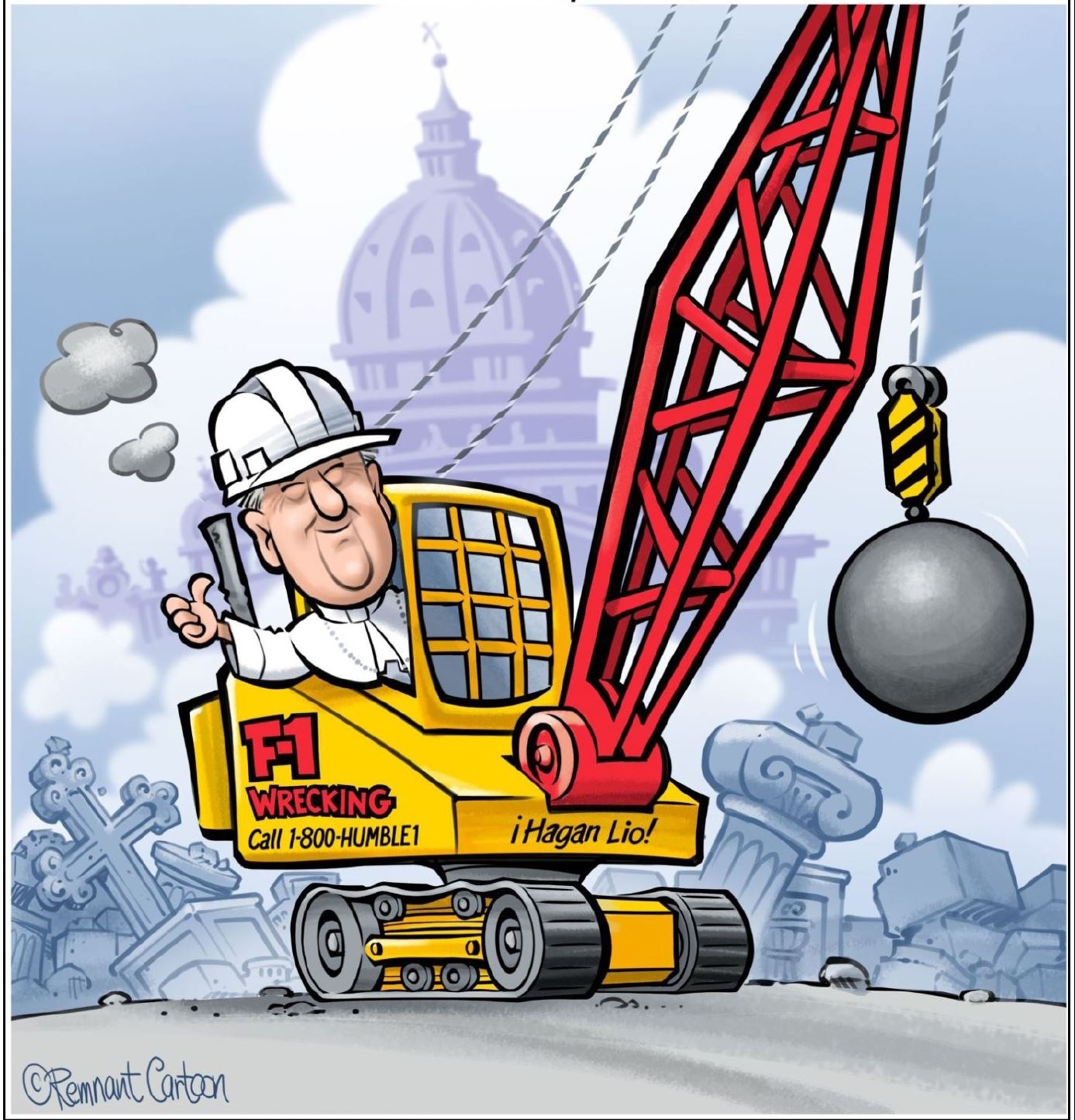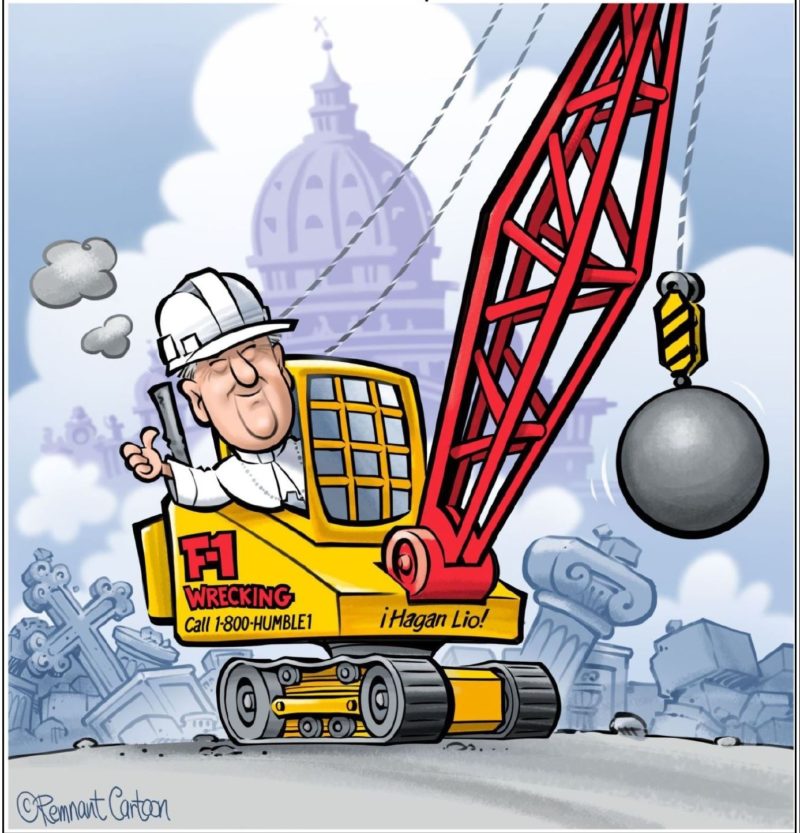Fatima Perspectives #1338

Courtesy of the Remnant Newspaper
In an addendum to their historic eight-page declaration against the errors of the Instrumentum Laboris for the upcoming “Shamazon Synod,” as Michael Matt dubs it, Cardinal Raymond Burke and Bishop Athanasius Schneider finally squarely identify Pope Francis as the ultimate source of “the almost general doctrinal confusion which is reigning in the life of the Church in our days,” which they had hitherto attributed to some sort of malaise of indeterminate origin.
The addendum begins with the usual acknowledgment of the parlous state of doctrine nearly sixty years after the Second Vatican Disaster: “ambiguities regarding the indissolubility of marriage, which is being relativized through the practice of the admittance of persons cohabitating in irregular unions to Holy Communion, due to the increasing approval of homosexual acts, which are intrinsically contrary to nature and contrary to the revealed will of God, due to errors regarding the uniqueness of Our Lord Jesus Christ and His redemptive work, which is being relativized through erroneous affirmations on the diversity of religions, and especially due to the recognition of diverse forms of paganism and their ritual practices through the Instrumentum Laboris for the coming Special Assembly of the Synod of Bishops for the Pan-Amazon.”
Apart from “erroneous affirmations on the diversity of religions,” which have proliferated since the Council (one thinks of the infamous Assisi events during the reign of John Paul II), the specific developments enumerated in the passage quoted have arisen during this pontificate as its peculiar indices of papally-induced ecclesial decline.
What, then, of Francis? Finally, Burke and Schneider bring his role into focus:
- “However, if we would be silent, we would violate our conscience. In this context we think of the well-known words of the future Saint Cardinal John Henry Newman (who will be canonized on October 13, 2019): “I shall drink — to the Pope, if you please, — still, to Conscience first, and to the Pope afterwards”….
- “We think of these memorable and germane words of Melchior Cano, one of the most learned bishops during the Council of Trent: “Peter does not need our adulation. Those who blindly and indiscriminately defend every decision of the Supreme Pontiff are those who most undermine the authority of the Holy See: they destroy, instead of strengthening its foundations”.
- “In recent times, there has been created an atmosphere of an almost total infallibilization of the statements of the Roman Pontiff, that is to say, of every word of the Pope, of every pronouncement, and of merely pastoral documents of the Holy See….”
And then this:
- “One must keep in mind the fact that the Apostle Paul publicly reproached the first Pope at Antioch in a matter of a lesser gravity, compared to the errors which in our days are spread in the life of the Church….
- What would St. Paul, St. Athanasius and the other great figures of Christianity say, when reading such a phrase and the errors expressed in the Instrumentum Laborisfor the coming Special Assembly of the Synod of Bishops for the Pan-Amazon? It is impossible to think that these figures would remain silent, or would let themselves be intimidated with reproaches and accusations of speaking “against the Pope”….
- …. How would the Apostle Paul react today, if he would read the sentence of the Abu Dhabi document [signed by Pope Francis] which says that God wants in His wisdom equally the diversity of sexes, nations and religions (among which there are religions which practice idolatry and blaspheme Jesus Christ)!…. The affirmation on the diversity of religions in the Abu Dhabi document and especially the errors in the Instrumentum Laboris… contribute to a betrayal of the incomparable uniqueness of the Person of Jesus Christ and of the integrity of the Catholic Faith.
- When Pope Honorius I in the seventh century showed an ambiguous and dangerous attitude regarding the spread of the heresy of monothelitism, which denied that Christ had a human will, St. Sophronius, Patriarch of Jerusalem, sent a bishop from Palestine to Rome [to demand a papal retraction]…. If St. Sophronius lived today, he certainly would be accused of speaking “against the Pope”.
- A similar situation existed in the fourth century, when with the silence of almost the entire episcopate, the consubstantiality of the Son of God was betrayed in favor of ambiguous doctrinal affirmations of semi-Arianism, a betrayal in which even Pope Liberius participated for a short time. Athanasius never tired of publicly denouncing such ambiguity. Pope Liberius excommunicated him in the year 357…. It is significant that Pope Liberius, unlike all his predecessors, was the first pope whose name was not included in the Roman Martyrology.
And, finally, this:
“For the Pope is the first in the Church to whom applies this admonition of the Holy Scripture: ‘Hold the form of the sound words that you have heard from me, in the faith and love that are in Christ Jesus. By the Holy Spirit who dwells in us, guard the good deposit entrusted to you.’” (2 Tim. 1:13-14)
Unless and until there is direct opposition from members of the hierarchy to the ruinous course of this pontificate, there is no hope, humanly speaking, of a course correction. Perhaps now that these two prelates have finally identified Pope Francis as the source of the particular errors they oppose, other hierarchs will follow their example, which in turn follows that of Saint Paul in his rebuke of the first Pope. Perhaps, that is, they will do their duty as successors of the Apostles.
Failing that, however, the only remedy for our situation will be from on high, as God undoes the folly and punishes the defection of His ministers.
Want to read more?
Latest Fatima Perspectives
Fatima Perspectives Archive




